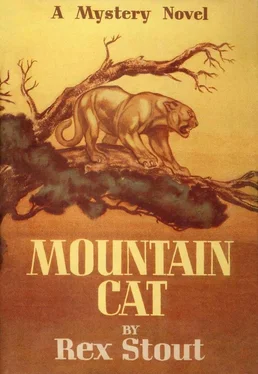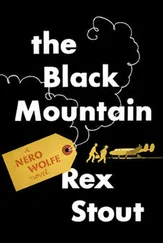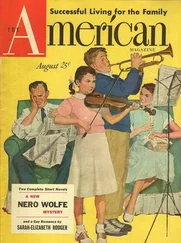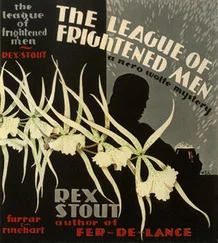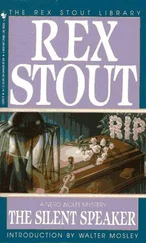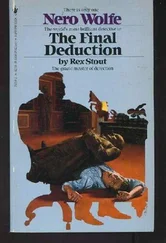The church of which the Reverend Rufus Toale was pastor had always been open on weekdays, for those who might wish to enter to pray, but seldom might more than one or two suppliants have been discovered there. Friday they straggled in and out all day, pointing out to each other inside, with whispers, the place where Clara Brand had sat the evening before, just prior to murdering the pastor. At the same time other people were slowing up their cars as they drove past 139 Vulcan Street, pointing out the windows of the front room in which Delia Brand had shot and killed Rufus Toale, forty-eight hours almost to the minute since she had shot and killed Dan Jackson, which was surely a record. The contradiction was merely one aspect of the raging controversy which had divided Park County into two hostile camps.
In his office on the top floor of the new Sammis Building on Mountain Street, Lem Sammis, with his jaw permanently sidewise, sat gazing across his desk at a man, ten years his junior, whose dark intent eyes displayed neither friendliness nor good humor but yet were not antagonistic. The man was saying:
“No, Lem, I’m not selling any soft soap. You may cut my throat some day or I may cut yours. But we’re together against these rats. Baker turns it off before this day’s over or he’s done, and we’ll get Carlson. The mining business made this state, and by God, the mining business will run it. Maybe your daughter killed Jackson or maybe you did it yourself. I don’t give a damn. I hope to put the screws on you some day, but not like this, and not with that bunch helping me. Matthews has crawled into a hole, but I’ll find him and I’ll deal with him.”
Lem Sammis said coldly, “I’m asking no favors, Ollie.”
“Favors hell. You know and I know how it stands. We can deal with each other after we’ve dealt with this. I’ll get hold of Matthews.”
“When you find him tell him from me—”
“I’m not telling anybody anything from you. I’m telling ’em myself.”
“Go to hell.”
“After you, Lem.”
Ollie Nevins departed. Sammis sat awhile without moving, then reached for his phone and spoke into it. In a moment the door opened and Chief of Police Frank Phelan entered, glanced apprehensively at the old face with the rigid sidewise jaw, crossed to a chair, and sat.
“Well, Frank? They froze you out?”
Phelan nodded gloomily. “They did. They wanted to use my men on a warrant to search Dan’s house and I balked.”
“Who gave ’em the warrant — Merriam?”
“Yes.”
“They going to use it?”
“Yes. A pair of them goddam county tramps.”
Sammis’s jaw went another quarter of an inch sidewise. “Searching Amy’s house. Lem Sammis’s daughter. Huh? Tell me what happened before you left.”
Phelan cleared his throat and started. That was around noon.
It was still happening, at the courthouse. In the county attorney’s office Baker was at his desk, a stenographer with a notebook was across from him, Sheriff Tuttle stood by a window with his hands in his pockets, and Clara Brand was seated in a chair which directly faced Baker’s. She looked resolute and tense, but played out, with her eyes swollen and bloodshot, and her hands, in her lap, kept clasping and unclasping. She was saying:
“I don’t care what you’ve found out or haven’t found out. I told you everything last night and I told you the truth.”
Baker himself looked the worse for wear. His eyes were bloodshot, too, and he had the general appearance of a man indulging in a hangover. He gazed at her and demanded, “Then you stick to your story as you told it last night?”
“I do.”
“And you expect me to believe it? Do you remember what you said? You said that when the housekeeper told you she didn’t know where Toale was or when he would be back, you told her you would wait and you would like to wait in the church, and she got the key and let you in at the rear. So far all right, Mrs. Bonner says the same thing. You told her that no matter what time Toale returned you would be in the church and she was to ask him to join you there. You groped your way down the aisle to the pew your mother always occupied, and you sat there an hour without moving. Then suddenly you decided to leave, to go home, and you went and told Mrs. Bonner and then got in your car and drove home. That was your story.”
“It still is.”
“But it’s not as plausible as it sounded last night. As I’ve told you, you are not charged with the murder of Rufus Toale. You are not at present charged with anything. But at least one detail of your story is next to incredible. Last night we had no notion of where Toale had been when he was shot. This morning we learned that it must have been there alongside the church, between the drive and the rear entrance. We found where he had fallen into the edge of a flower bed. His hat was there and there was blood on the grass. Undoubtedly, returning, he had either taken his car to his garage or left it there on the drive and, before entering the parsonage, had gone toward the church for the nightly visit which was his invariable custom. That’s where he was shot. The rear door of the church was standing open. You were seated in that pew, in silence and darkness. Will you tell me again that you heard no shot fired?”
“Certainly I will. I’ve told you why. If the shot was fired there.”
“It was. You said you were buried in your thoughts. You were oblivious. Frankly, I don’t believe it. So oblivious you didn’t hear a shot fired as near as that? It must have been from a point between the flower bed and the church, if Toale was headed for the church, as he must have been, for the bullet entered the middle of his chest, pierced the lung and lodged in the spine. No matter how deep you were in thought—”
“I tell you I didn’t hear it.” Clara clasped her hands again. “Or maybe I heard it but I didn’t know it. I’ve told you I had just learned what people were saying about my mother. I’ve told you that’s what I went there to ask him about. I didn’t hear any shot, and that’s all I’ll ever say about it. It’s all I can say.”
“You heard no shot, no call for help? Nothing?”
“Nothing.”
“And you were in that pew continuously from the time Mrs. Bonner let you in until you went and told her you were going home?”
“I was.”
“And — we’ll put this on the record again today — you didn’t shoot Toale yourself?”
“I did not.”
“You didn’t hear his car on the drive and conceal yourself in the shrubbery and, as he approached with the lights of the car behind him, shoot him?”
“I did not.”
“It was Lem Sammis who told you what people were saying about your mother, wasn’t it?”
No answer.
“Wasn’t it Lem Sammis who told you that?”
“That’s none of your business. I’ve already told you that I won’t say who told me.”
“Didn’t Lem Sammis, with his wife, call at your home last evening?”
“That’s none of your business either.”
“Well, he did, and it was soon after he left that you went to see Toale.” Baker leaned forward and narrowed his eyes at her. “Look here, Clara. Will you listen to what I say?”
“I’ll listen.”
“All right. I want you to believe, because it’s the truth, that I’m not trying to build up anything against you. Things like your telling me Wednesday morning that you had gone to see Atterson Brothers Tuesday afternoon, and my learning that you hadn’t been there, and your saying now that you went to the Fowler Hotel and waited there for Mrs. Cowles — I’m not holding that against you. I don’t even hold it against you that you refuse to tell me any of the things that happened, that must have happened, in Jackson’s office the past year or two. I don’t hold it against you because I understand it. You’re being loyal to Lem Sammis, the old friend and partner of your father. How would you feel if you knew that Sammis had tried to frame both you and your sister on charges of murder?”
Читать дальше
